
Alfred Elton van Vogt was a Canadian-born American science fiction writer. His fragmented, bizarre narrative style influenced later science fiction writers, notably Philip K. Dick. He was one of the most popular and influential practitioners of science fiction in the mid-twentieth century, the genre's so-called Golden Age, and one of the most complex. The Science Fiction Writers of America named him their 14th Grand Master in 1995.

Damon Francis Knight was an American science fiction author, editor, and critic. He is the author of "To Serve Man", a 1950 short story adapted for The Twilight Zone. He was married to fellow writer Kate Wilhelm.
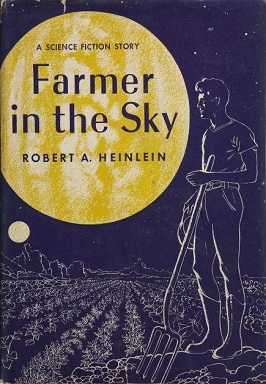
Farmer In The Sky is a 1950 science fiction novel by American writer Robert A. Heinlein about a teenaged boy who emigrates with his family to Jupiter's moon Ganymede, which is in the process of being terraformed. Among Heinlein's juveniles, a condensed version of the novel was published in serial form in Boys' Life magazine, under the title "Satellite Scout". The novel was awarded a Retro Hugo in 2001.

Scarlet Street is a 1945 American film noir directed by Fritz Lang. The screenplay concerns two criminals who take advantage of a middle-aged painter in order to steal his artwork. The film is based on the French novel La Chienne by Georges de La Fouchardière, which had been previously dramatized on stage by André Mouëzy-Éon, and cinematically as La Chienne (1931) by director Jean Renoir.

EuroTrip is a 2004 American teen sex comedy film directed by Jeff Schaffer and written by Alec Berg, David Mandel, and Schaffer. It stars Scott Mechlowicz, Jacob Pitts, Michelle Trachtenberg, Travis Wester, and Jessica Boehrs. Mechlowicz portrays Scott "Scotty" Thomas, an American high school graduate who travels across Europe in search of his German pen pal, Mieke (Boehrs). Accompanied by his friend Cooper (Pitts) and twin siblings Jenny and Jamie, Scott's quest takes him to England, France, the Netherlands, Slovakia, Germany, and Italy, encountering awkward, humorous, and embarrassing situations along the way.

Frequency is a 2000 American science fiction thriller film starring Dennis Quaid, Jim Caviezel, Andre Braugher, Elizabeth Mitchell, Shawn Doyle, Melissa Errico, and Noah Emmerich.
"Common Time" is a science fiction short story by American writer James Blish. It first appeared in the August 1953 issue of Science Fiction Quarterly and has been reprinted several times: in the 1959 short-story collection Galactic Cluster; in The Testament of Andros (1965); in The Penguin Science Fiction Omnibus (1973); and in Isaac Asimov Presents the Great SF Stories.
Orbit was a series of anthologies of new science fiction edited by Damon Knight, often featuring work by such writers as Gene Wolfe, Joanna Russ, R. A. Lafferty, and Kate Wilhelm. The anthologies tended toward the avant-garde edge of science fiction, but by no means exclusively; occasionally the volumes featured nonfiction critical writing or humorous anecdotes by Knight. Inspired by Frederik Pohl's Star Science Fiction series, and in its turn an influence on other original speculative fiction anthologies, it ran for over a decade and twenty-one volumes, not including a 1975 "Best of" collection selected from the first ten volumes.
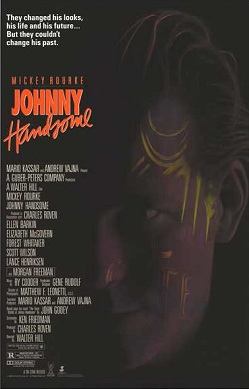
Johnny Handsome is a 1989 American neo-noir crime thriller film directed by Walter Hill and starring Mickey Rourke, Ellen Barkin, Forest Whitaker and Morgan Freeman. The film was written by Ken Friedman, and adapted from the novel The Three Worlds of Johnny Handsome by John Godey. The music for the film was written, produced and performed by Ry Cooder, with four songs by Jim Keltner.

Fear and Loathing in Las Vegas is a 1998 American stoner road black comedy film based on Hunter S. Thompson's novel of the same name. It was co-written and directed by Terry Gilliam and stars Johnny Depp and Benicio del Toro as Raoul Duke and Dr. Gonzo, respectively. The film details the duo's journey through Las Vegas as their initial journalistic intentions devolve into an exploration of the city under the influence of psychoactive substances.

Duke Lavery is a fictional character from General Hospital, an American soap opera on the ABC network, primarily portrayed by Ian Buchanan. The role was created by executive producer Gloria Monty and co-head writer Norma Monty. Duke is introduced as the mysterious owner of a local night club who falls in love with police chief Anna Devane. Unbeknownst to the rest of Port Charles, Duke is laundering money for the mob but when his criminal ties cost him Anna, he teams with her ex-husband Robert Scorpio to bring down the mob. Duke and Anna's romance becomes quite popular among fans achieving supercouple status and rivaling Anna's romance with Robert. In 1988, Duke's feud with the Jerome crime family leads to Anna miscarrying their unborn child. Duke and Anna's story comes to a tragic end in 1989 when Duke is presumed dead. The producers would recast the role with Greg Beecroft as Jonathan Paget who was revealed to be Duke with plastic surgery only for the character to be killed off in 1990 – dying in Anna's arms due fan disapproval.
"Both Sides Now" is the twenty-fourth episode and season finale of the fifth season of House. It originally aired on Fox on May 11, 2009.

Merantau, released in some countries as Merantau Warrior, is a 2009 Indonesian martial arts action film written, directed and edited by Gareth Huw Evans, and starring Iko Uwais. The film marked Uwais' debut as an actor and was the first collaboration between director Evans and star Uwais. It also marks the acting debut of Yayan Ruhian, who, along with Uwais, Evans met while shooting for a documentary in Indonesia. It was this documentary which introduced Evans to the martial art of Pencak Silat.
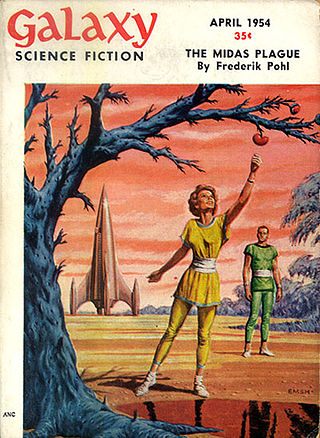
"Special Delivery" is a science fiction short story by American writer Damon Knight. It first appeared in the April 1954 issue of Galaxy Science Fiction and has been reprinted a number of times, in Operation Future (1955), Far Out (1961), and The Best of Damon Knight (1976).

"Through the Looking Glass and What Walter Found There" is the sixth episode of the fifth season of the Fox science-fiction/drama television series Fringe, and the 93rd episode overall.
"Dead Man on Campus" is the eighth episode of the fifth season of the American series The Vampire Diaries and the series' 97th episode overall. "Dead Man on Campus" was originally aired on November 21, 2013, on The CW. The episode was written by Brian Young and Neil Reynolds and directed by Rob Hardy.
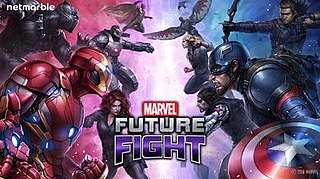
Marvel: Future Fight is a 2015 superhero-themed mobile video game developed by Netmarble Games.
Ryan Jamaal Swain is an American actor and dancer. He is known for his role as Damon Richards-Evangelista, a gay dancer, in the FX television series Pose.
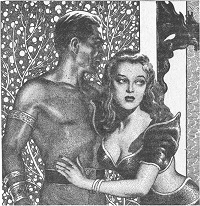
"Cornzan the Mighty" is a classic science fiction story by L. Sprague de Camp. It was first published under the variant title "Cornzan, the Mighty" in the magazine Future Science Fiction for December, 1955. All later appearances omit the comma. It first appeared in book form in the collection A Gun for Dinosaur and Other Imaginative Tales. The story has been translated into German.

"Babel II" is a comedic science fiction short story by Damon Knight. The protagonist accidentally causes a second Tower of Babel through his interactions with a trans-dimensional traveller. First published in Beyond Fantasy Fiction in 1953, the story has been a topic of commentary ever since.














